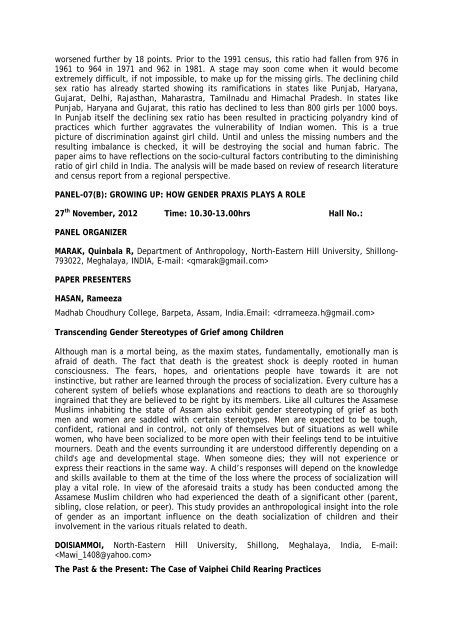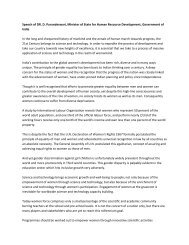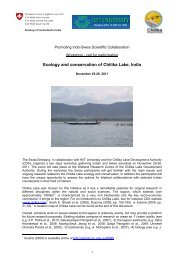PANEL ORGAN - KIIT University
PANEL ORGAN - KIIT University
PANEL ORGAN - KIIT University
You also want an ePaper? Increase the reach of your titles
YUMPU automatically turns print PDFs into web optimized ePapers that Google loves.
worsened further by 18 points. Prior to the 1991 census, this ratio had fallen from 976 in<br />
1961 to 964 in 1971 and 962 in 1981. A stage may soon come when it would become<br />
extremely difficult, if not impossible, to make up for the missing girls. The declining child<br />
sex ratio has already started showing its ramifications in states like Punjab, Haryana,<br />
Gujarat, Delhi, Rajasthan, Maharastra, Tamilnadu and Himachal Pradesh. In states like<br />
Punjab, Haryana and Gujarat, this ratio has declined to less than 800 girls per 1000 boys.<br />
In Punjab itself the declining sex ratio has been resulted in practicing polyandry kind of<br />
practices which further aggravates the vulnerability of Indian women. This is a true<br />
picture of discrimination against girl child. Until and unless the missing numbers and the<br />
resulting imbalance is checked, it will be destroying the social and human fabric. The<br />
paper aims to have reflections on the socio-cultural factors contributing to the diminishing<br />
ratio of girl child in India. The analysis will be made based on review of research literature<br />
and census report from a regional perspective.<br />
<strong>PANEL</strong>-07(B): GROWING UP: HOW GENDER PRAXIS PLAYS A ROLE<br />
27 th November, 2012 Time: 10.30-13.00hrs Hall No.:<br />
<strong>PANEL</strong> <strong>ORGAN</strong>IZER<br />
MARAK, Quinbala R, Department of Anthropology, North-Eastern Hill <strong>University</strong>, Shillong-<br />
793022, Meghalaya, INDIA, E-mail: <br />
PAPER PRESENTERS<br />
HASAN, Rameeza<br />
Madhab Choudhury College, Barpeta, Assam, India.Email: <br />
Transcending Gender Stereotypes of Grief among Children<br />
Although man is a mortal being, as the maxim states, fundamentally, emotionally man is<br />
afraid of death. The fact that death is the greatest shock is deeply rooted in human<br />
consciousness. The fears, hopes, and orientations people have towards it are not<br />
instinctive, but rather are learned through the process of socialization. Every culture has a<br />
coherent system of beliefs whose explanations and reactions to death are so thoroughly<br />
ingrained that they are believed to be right by its members. Like all cultures the Assamese<br />
Muslims inhabiting the state of Assam also exhibit gender stereotyping of grief as both<br />
men and women are saddled with certain stereotypes. Men are expected to be tough,<br />
confident, rational and in control, not only of themselves but of situations as well while<br />
women, who have been socialized to be more open with their feelings tend to be intuitive<br />
mourners. Death and the events surrounding it are understood differently depending on a<br />
child's age and developmental stage. When someone dies; they will not experience or<br />
express their reactions in the same way. A child’s responses will depend on the knowledge<br />
and skills available to them at the time of the loss where the process of socialization will<br />
play a vital role. In view of the aforesaid traits a study has been conducted among the<br />
Assamese Muslim children who had experienced the death of a significant other (parent,<br />
sibling, close relation, or peer). This study provides an anthropological insight into the role<br />
of gender as an important influence on the death socialization of children and their<br />
involvement in the various rituals related to death.<br />
DOISIAMMOI, North-Eastern Hill <strong>University</strong>, Shillong, Meghalaya, India, E-mail:<br />
<br />
The Past & the Present: The Case of Vaiphei Child Rearing Practices
















